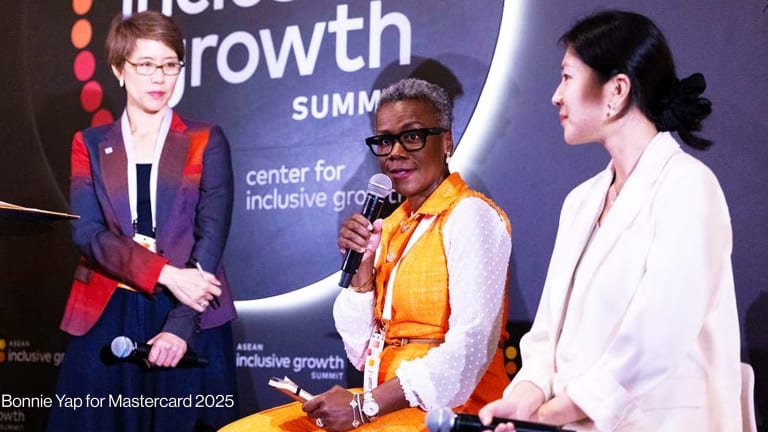
Five years ago, data.org launched with a clear mission: Build the emerging field of data for social impact — both the workforce and partnership across sectors that enable this work. Three years ago, with support from the Mastercard Center for Inclusive Growth, we significantly advanced this vision with the creation of the Capacity Accelerator Network, or CAN, a globally informed and locally grounded network that pairs academic expertise with mission-driven organizations. With our first accelerator based in the United States, we set out to build a workforce of purpose-driven data and AI practitioners to advance the use of data for social impact.
Today, as we reflect on five years of data-driven impact, we see both the progress and continued need for this work in communities around the world.
The field of data for social impact — which now includes the role of artificial intelligence in solving community challenges — is bigger and stronger than ever. With five accelerators across four continents, we have trained nearly 100,000 people with valuable skills and career experiences in data analytics, prompt engineering, and generative AI. Looking ahead, we aim to reach one million people trained by 2032, and we have an ambitious plan to make it happen.
The global purpose-driven data and AI workforce is fundamentally different now, thanks in part to our efforts and our collaboration with 85 cross-sector partners across the globe over the last three years since the launch of CAN. As we celebrate this five-year milestone and work to further accelerate workforce development around the world, here are three key lessons we’ve learned.
1. Demand still outpaces supply
The “Workforce Wanted: Data Talent for Social Impact” report identified the potential to create and fill 3.5 million data for social impact jobs by 2032 and became the basis for our goal to train 1 million data practitioners in the social sector within data.org’s network alone. Let’s put that number in perspective with the speed of innovation. The report was released in June 2022. It would be another five months before ChatGPT would launch. Think of how much has changed in the time since. With the proliferation of AI tools, the demand for AI-skilled workers has skyrocketed.
The opportunity before us to grow this purpose-driven workforce is greater than ever, and we are acting with urgency to provide hands-on training not only to early career professionals but also to existing workers and people from nontechnical backgrounds so that no one is left behind in the AI race. Our capacity accelerators in the U.S., India, Asia Pacific, Latin America, and Africa are an essential part of that strategy, helping us reach rural and remote areas, close the digital divide, and equip more people — including more women — with the skills needed to be competitive in today’s economy. Through CAN, we are on a mission to drive innovation, increase incomes, and improve the quality of life for communities around the world.

2. We need skilled workers, but we also need savvy employers
It is not enough to train talent. We must also ensure that governments and private sector organizations can effectively absorb and deploy this new workforce. This is especially true in the social sector, where constrained resources and a limited ability to compete with private sector salaries often leave social impact organizations far behind in leveraging data and AI in their work.
Through CAN, we have taken a dual approach, building workforce pipelines while also improving organizational readiness. Our Data Maturity Assessment, used by over 3,000 people to date, offers a pulse check, helping organizations measure and understand where they stand in their data journey today and how they may consider moving forward.
Initiatives such as the UChicago summer program through the U.S. CAN and CAN fellowships in India and Africa pair students in need of practical experience with organizations that need help with better integrating data talent into their work. By investing in both employees and employers, we are creating sustainable pathways for data professionals to apply their skills where they are needed most.
3. Visionary ideas need practical solutions
While there is no shortage of think pieces and analysis on the risks and rewards of AI, at data.org, our focus is on implementation. The training programs across CAN incorporate real-world datasets, collaborative projects, and experiential learning opportunities with local community partners. For example, our APAC Data Capacity Accelerator will equip women entrepreneurs and small business owners with the skills and tools to use data and AI, helping them grow their businesses and improve their financial well-being.
In addition to our accelerators, we have a growing digital learning portfolio where people around the world are learning about how to apply data and AI across sectors. The coursework emphasizes implementation through tangible case studies. Our global innovation challenges also go beyond identifying promising ideas and elevating concrete tools and scalable solutions. By staying anchored in practical applications, we accelerate impact, allowing data practitioners and social impact organizations in our network to put data and AI to work for them from day one.
Learn more about data.org’s five years of impact and stay up-to-date on practical data and AI resources by signing up to receive our monthly newsletter.








